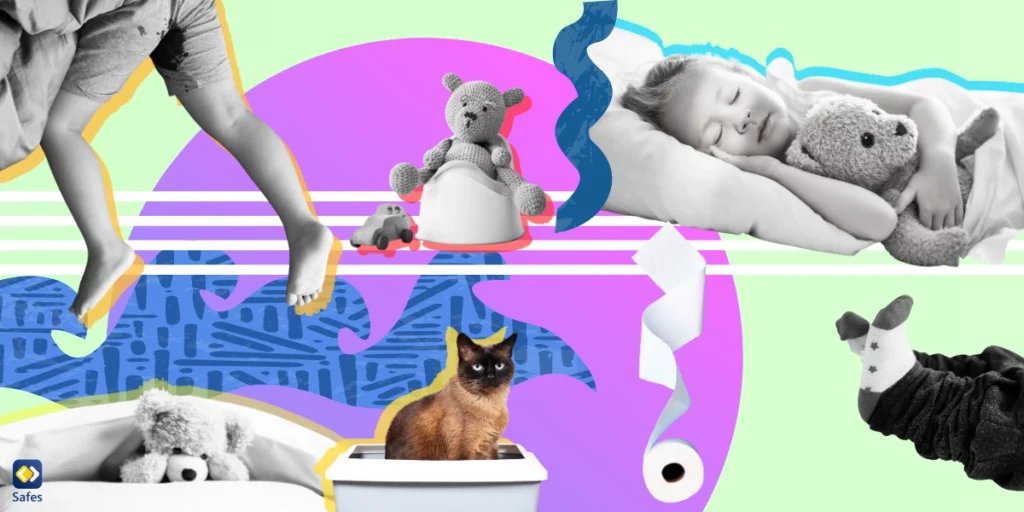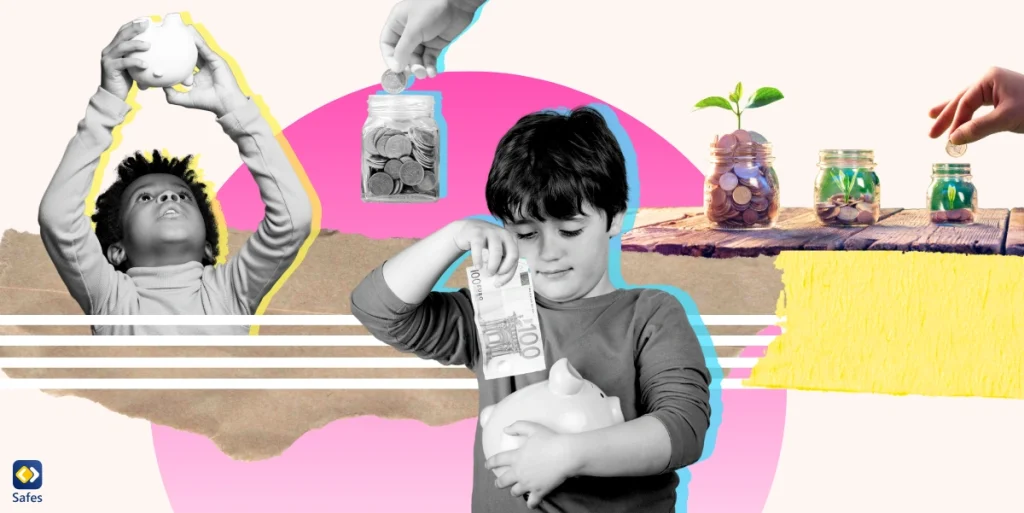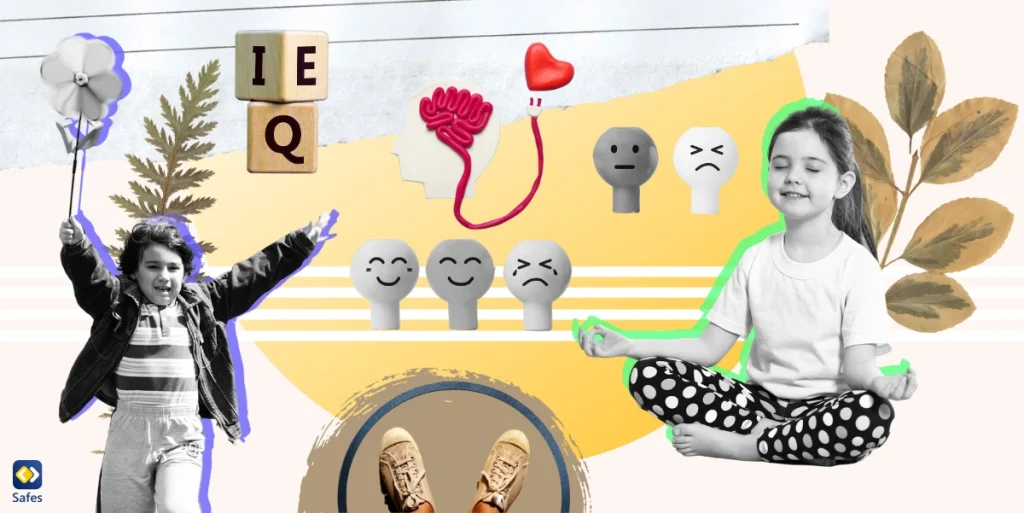Bedwetting, or nocturnal enuresis, can be a challenging experience for both children and their parents. While we often attribute it to physical factors such as bladder control or hormonal imbalances, it’s crucial to understand that bedwetting can also have psychological roots that require attention and understanding. In this article, we’ll shine a light on the psychological causes of bedwetting. We’ll explore various factors that can contribute to this condition, going beyond the surface-level reasons and delving into the impact of emotions, stress, and even screen time on a child’s ability to stay dry throughout the night.
Download and Start Your Free Trial of the Safes Parental Control App
While it’s true that not all cases of bedwetting have a psychological origin, it’s essential to consider this aspect, as it can significantly impact a child’s self-esteem, emotional well-being, and overall development. By understanding the psychological causes, we can approach bedwetting with a more holistic perspective, offering support and tailored solutions to help our little ones overcome this challenge.
Understanding Bedwetting
Bedwetting refers to the unintentional passage of urine during sleep in children who are old enough to have achieved bladder control during the day. It is a common childhood issue that can cause frustration and concern for both children and their parents or caregivers.
Bedwetting is more common in younger children and tends to decrease as they grow older. According to research, about 15-20% of 5-year-olds and 5-10% of 10-year-olds experience bedwetting. It’s important to remember that every child develops at their own pace, and occasional bedwetting is considered normal until around the age of 5 or 6.
Nighttime bladder control is a developmental milestone that varies from child to child. Most children achieve daytime bladder control between 2 and 4, while nighttime bladder control typically takes longer to develop. The ability to stay dry through the night is influenced by several factors, including the maturation of the nervous system, the production of an antidiuretic hormone that reduces urine production at night, and the capacity of the bladder to hold urine.
It’s important to note that even after a child has achieved daytime bladder control, it’s common for them to continue having accidents during sleep. The process of nighttime bladder control can take several years, and children may still experience occasional bedwetting up until the age of 5 or 6.
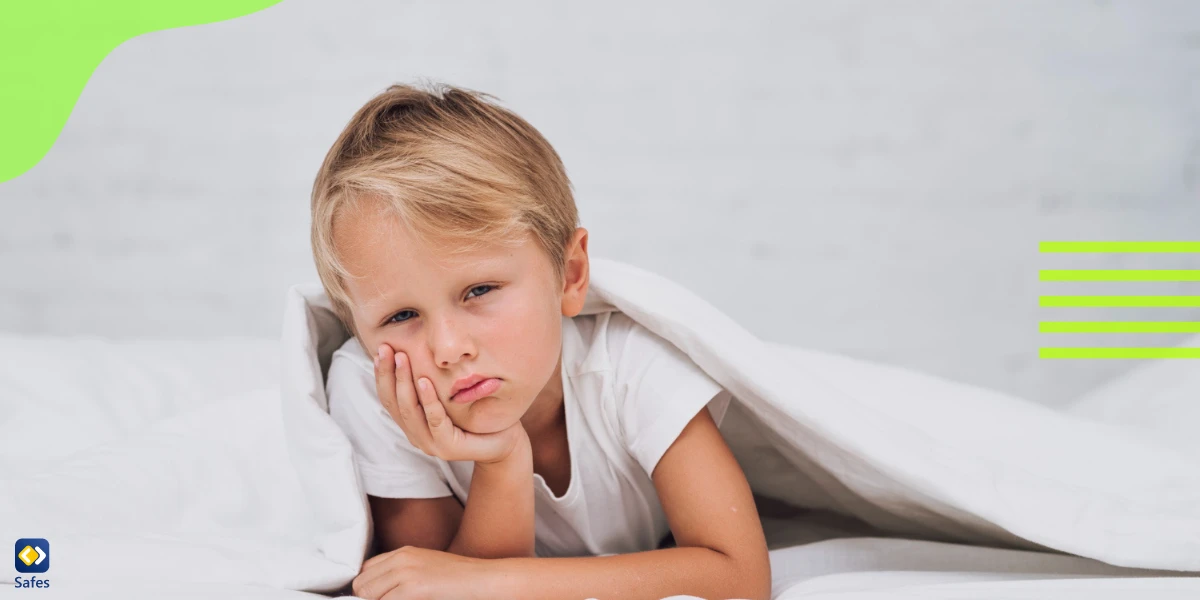
Physical vs. Psychological Causes of Bedwetting
Regarding the causes of bedwetting, we can differentiate between physical and psychological factors. While physical factors primarily involve the developmental stages of a child’s bladder control, psychological factors also play a significant role in this common childhood issue.
Physical factors encompass the maturation of the nervous system, the production of antidiuretic hormone, and the capacity of the bladder to hold urine. As a child grows and develops, these physical aspects gradually improve, leading to better control over their bladder during sleep.
On the other hand, psychological factors can have a profound impact on bedwetting. One such factor that has recently gained attention is excessive screen time. The extensive use of electronic devices, such as smartphones, tablets, and computers, has become a prevalent part of modern childhood. However, as Alicia Eaton (clinical hypnotherapist and advanced practitioner of NLP -neuro-linguistic programming) explains in her book, excessive screen time can disrupt a child’s sleep patterns and contribute to bedwetting.
The blue light emitted by screens can interfere with the production of melatonin, a hormone responsible for regulating sleep. Consequently, disrupted sleep can affect bladder control and increase the likelihood of bedwetting episodes. Additionally, the stimulating content found on screens can cause emotional arousal, leading to increased anxiety and stress levels, which can also contribute to bedwetting.
What Is the Psychological Reason for Bedwetting in Children?
In the following, we will explore the various psychological causes that contribute to bedwetting in children. Understanding these factors can help you address the issue effectively and provide the necessary support to your child.
Anxiety and Stress
Emotional stressors, such as anxiety and stress, can significantly impact a child’s ability to stay dry at night. These emotions can trigger the release of stress hormones, affecting bladder control during sleep.
Some common stressors include:
- Starting school
- Family conflicts
- Changes in routine
Identifying and addressing these underlying stressors is essential to help your child manage their emotions and regain control.
Sleep Disorders and Disruptions
Sleep disorders, such as sleep apnea (interrupted breathing during sleep) or restless leg syndrome (uncomfortable sensations in the legs), can disrupt a child’s sleep patterns, leading to bedwetting. Understanding and treating these conditions can help improve nighttime bladder control.
Developmental Delays and Emotional Immaturity
Children with delayed emotional or social development may struggle with emotional regulation, making it more challenging for them to stay dry at night. Emotional regulation skills and self-esteem play an essential role in a child’s ability to overcome bedwetting. Supporting the child in developing these skills can boost their confidence and aid in their journey toward dry nights.
Connection Between Screen Time and Bedwetting
As explained earlier, research suggests that excessive screen time, especially before bedtime, can disrupt sleep patterns and affect bladder control, contributing to bedwetting. Setting limits on screen time can be beneficial in managing bedwetting issues.
The blue light emitted by screens can suppress the production of melatonin, a hormone essential for sleep regulation. Disrupted sleep patterns can then affect bladder control, increasing the likelihood of bedwetting incidents.
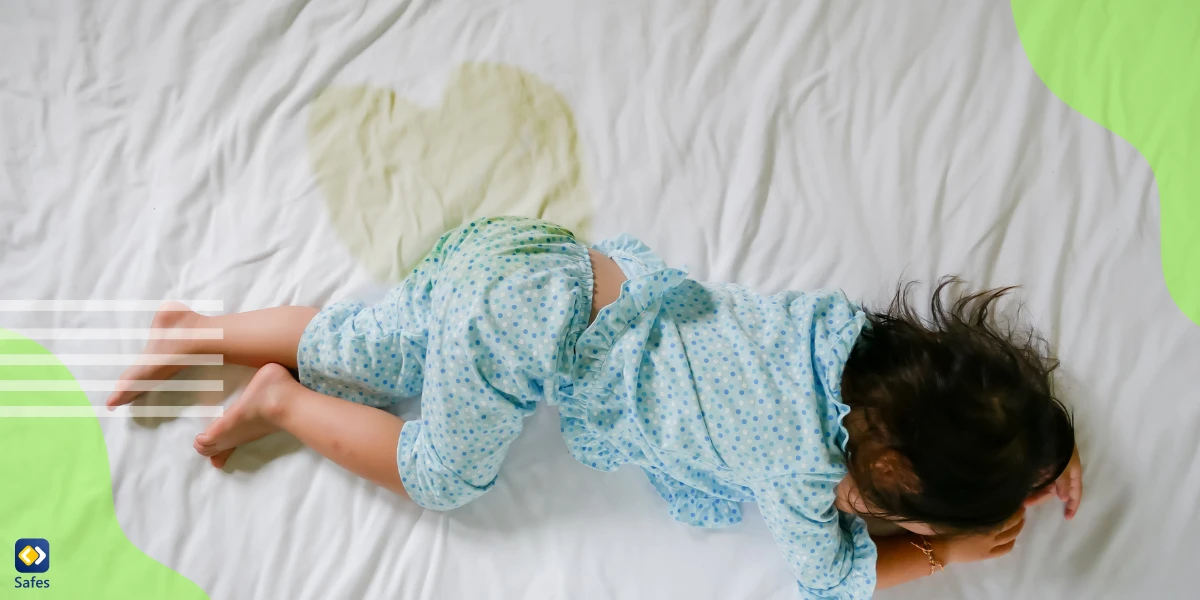
Managing Psychological Causes of Bedwetting
Understanding and managing psychological causes for bedwetting is crucial for effective treatment. So, now let’s explore strategies for managing the psychological causes of bedwetting, including creating a supportive environment, addressing stress and anxiety, establishing healthy sleep habits, and managing screen time. You can find more tips in this article: Say Goodbye to Bedwetting: Home Remedies to Keep Your Child from Wetting Their Bed
Creating a Supportive Environment
Encouraging children to openly discuss their feelings and concerns about bedwetting can help reduce any shame or embarrassment they may feel. Assure your child that bedwetting is a common issue and that it does not define their worth or character. Offering unconditional love and support can boost their self-esteem and confidence.
Addressing Stress and Anxiety
Identifying and addressing potential stressors in a child’s life, such as school pressures or family dynamics, can help alleviate anxiety and reduce the occurrence of bedwetting. Teach your child relaxation techniques, such as deep breathing or visualization exercises, to help them manage stress and anxiety effectively.
Establishing Healthy Sleep Habits
Ensuring that children have a regular sleep schedule and receive enough sleep can contribute to better bladder control during the night. Make the bedroom a comfortable and calming space by minimizing distractions and creating a relaxing atmosphere to promote quality sleep and minimize the chances of bedwetting.
Managing Screen Time
As you know, excessive screen time before bed can disrupt sleep patterns and contribute to bedwetting. So, establish clear rules and boundaries around screen usage to help create a healthier sleep routine for your child. Encourage your child to engage in various activities beyond screens, such as outdoor play or hobbies, to promote a more balanced and fulfilling lifestyle.
How Can Safes Help by Controlling Your Child’s Screen Time?
The Safes parental control app can be a useful tool in addressing bedwetting in children by allowing parents to have control over their screen time, regulate their sleep patterns, reduce stress and anxiety, and block inappropriate apps, websites, and search keywords on their iOS, Android, Windows, and Mac devices.
By setting limits on screen time, you can ensure that your child is not spending excessive hours on devices, which can disrupt their sleep patterns and contribute to bedwetting.
The app also allows you to block access to certain apps, websites, and search keywords that may be inappropriate or triggering for your child, helping to reduce stress and anxiety that can contribute to bedwetting.
By providing a safe and monitored digital environment, the Safes app can assist you in promoting healthy sleep habits and managing the psychological factors associated with bedwetting. Wish to help your child develop healthy sleeping habits? So, try setting up parental controls on different devices using Safes with the links down below:
- Windows parental controls
- Macbook parental controls
- Parental controls on Android
- iPhone parental controls
Take charge today with our 14-day free trial—start managing your child’s digital experience without any upfront payment!
Seeking Professional Help for Bedwetting
In some cases, you need to refer to a doctor for your child’s bedwetting problem. Consulting a healthcare professional will ensure a tailored plan to help your child overcome bedwetting and ensure their well-being. When to consult a healthcare professional regarding a child’s bedwetting? In cases such as:
Persistent Bedwetting: If your child continues to wet the bed beyond 7, it’s a good idea to consult a healthcare professional for further evaluation.
Emotional Distress: If bedwetting is causing significant emotional distress for your child, such as low self-esteem or anxiety, seeking professional guidance can be beneficial.
Daytime Wetting: If your child is experiencing daytime accidents besides bedwetting, it might indicate an underlying medical or psychological issue, warranting a visit to a healthcare professional.
Every child is unique, so depending on the circumstances and the underlying causes for your kid’s bedwetting issue, your doctor may prescribe a different treatment. However, some common treatments and interventions include:
Behavioral Techniques: Healthcare professionals often recommend implementing behavioral techniques, such as bladder training and moisture alarms, to help children develop better bladder control.
Medications: In some cases, healthcare professionals may prescribe medications, such as desmopressin or imipramine, to manage bedwetting. These medications can help reduce urine production or improve bladder function.
Counseling or Therapy: If psychological factors are contributing to bedwetting, healthcare professionals may suggest counseling or therapy to address any underlying emotional issues or stressors.
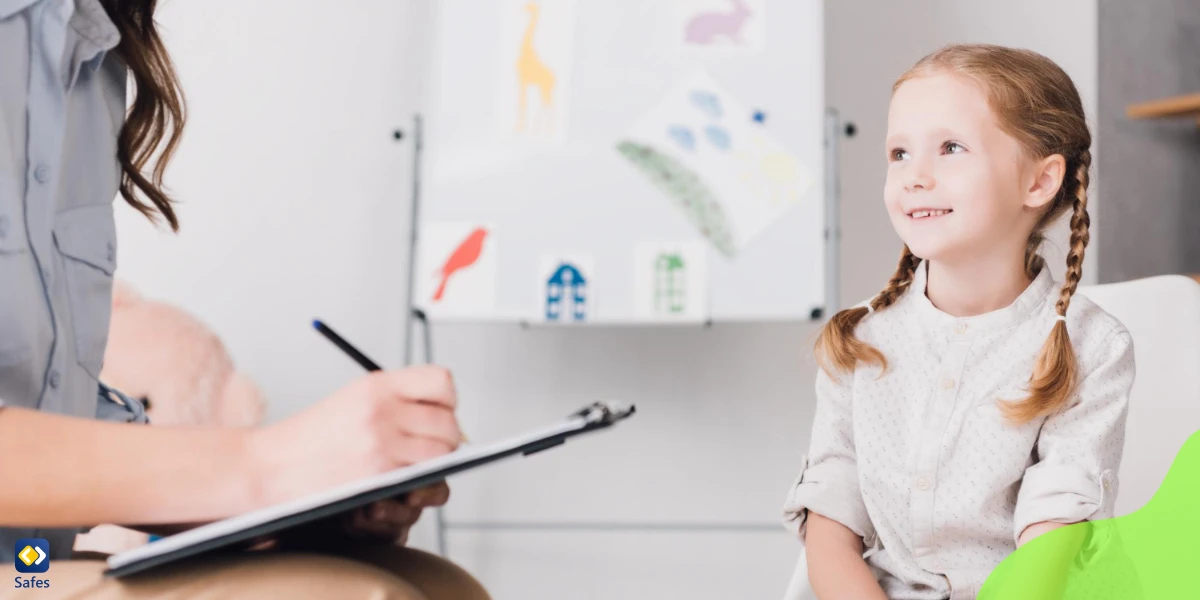
Final Words: What Psychological Problems Cause Bedwetting?
In this blog post, we delved into the psychological causes of bedwetting in children. We explored the potential impact of screen time on nighttime bladder control and highlighted the significance of understanding the normal developmental milestones related to this issue. By differentiating between physical and psychological factors, we shed light on the role of psychological elements, including screen time, in bedwetting.
Throughout the post, we provided strategies for creating a supportive environment, addressing stress and anxiety, establishing healthy sleep habits, and managing screen time. The mention of the Safes parental control app as a helpful tool to regulate screen time and reduce stress and anxiety adds a practical touch.
It’s essential to emphasize the need for consulting a healthcare professional when dealing with bedwetting. They can provide valuable guidance and explore available treatments and interventions, such as bladder training, medications, and counseling.
Frequently Asked Questions
We’ve compiled a list of questions and answers to help provide more information on the topic we discussed. If you have any more questions, please don’t hesitate to contact us. We’d be happy to help!
What are the causes of bedwetting in young adults?
Bedwetting in young adults can have various causes, both physical and psychological. Some common physical causes include an overactive bladder, hormonal imbalances, urinary tract infections, and sleep disorders like sleep apnea. Psychological causes can include stress, anxiety, and emotional immaturity. Additionally, certain medications or substances like alcohol and caffeine can contribute to bedwetting. It’s essential for young adults experiencing bedwetting to consult a healthcare professional to determine the underlying cause and develop an appropriate treatment plan.
How to stop bedwetting at age 14?
Stopping bedwetting at age 14 can be challenging, but here are a few tips to help:
Maintain a consistent bathroom routine: Remind your teenager to empty their bladder before bed and wake up to use the bathroom during the night if needed.
Limit fluid intake before bedtime: Encourage your teen to drink plenty of fluids throughout the day but limit their intake in the hours leading up to bedtime.
Encourage bladder training: Have your teenager gradually increase the time between bathroom visits during the day to help train their bladder to hold urine for longer periods.
Manage stress and anxiety: Bedwetting can sometimes be triggered by stress or anxiety. Help your teen manage any emotional challenges they may be facing through open communication and stress-reducing activities like exercise or relaxation techniques.
Consider medical intervention: If bedwetting persists despite these efforts, consult a healthcare professional who can provide further guidance and explore potential underlying causes or treatment options.
Remember, patience, understanding, and support are vital in helping your teenager overcome bedwetting at age 14 or any age above 7.
Is bedwetting a symptom of anxiety?
Bedwetting can sometimes be a symptom of anxiety. The stress and worry associated with anxiety can affect a child’s ability to control their bladder during sleep. It’s important to remember that not all bedwetting is caused by anxiety, but it can be a contributing factor in some cases. It’s always a good idea to consult a healthcare professional to determine the underlying causes and develop an appropriate treatment plan.
Your Child’s Online Safety Starts Here
Every parent today needs a solution to manage screen time and keep their child safe online.
Without the right tools, digital risks and excessive screen time can impact children's well-being. Safes helps parents set healthy boundaries, monitor activity, and protect kids from online dangers—all with an easy-to-use app.
Take control of your child’s digital world. Learn more about Safes or download the app to start your free trial today!
